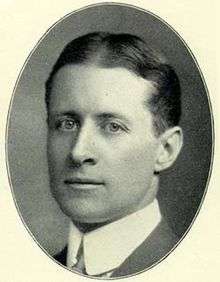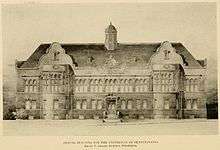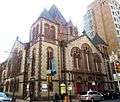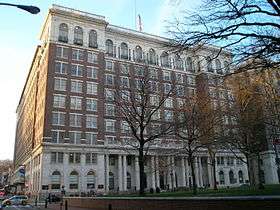Edgar Viguers Seeler
| Edgar Viguers Seeler | |
|---|---|
 | |
| Born |
November 18, 1867 Philadelphia, Pennsylvania |
| Died | October 26, 1929 |
| Resting place | West Laurel Hill Cemetery, Bala Cynwyd, Pennsylvania |
| Residence | Philadelphia, Pennsylvania |
| Education |
Central High School Massachusetts Institute of Technology |
| Occupation | Architect |
| Spouse(s) | Martha Page (Laughlin) Seeler |
| Parent(s) |
George Washington Seeler Anna Maria (Viguers) Seeler |
Edgar Viguers Seeler (1867–1929) was an American architect.
Biography
Early life
He was born on November 18, 1867 in Philadelphia, Pennsylvania.[1][2] His father was George Washington Seeler (1839-1911) and his mother, Anna Maria (Viguers) Seeler (1838-1868).[1] He graduated from Central High School in 1884.[1] He attended night classes at the Philadelphia Museum and School of Industrial Art.[1] He then graduated from the Massachusetts Institute of Technology in 1890.[1] He then attended the École nationale supérieure des Beaux-Arts under the tutelage of Victor Laloux (1850-1937) from 1890 to 1893.[1]
Career
Back in the United States, he established his own architectural practice at 328 Chestnut Street in Philadelphia.[1] From 1893 to 1898, he also worked as an Assistant Professor of Architectural Design at the University of Pennsylvania.
Arthur Ingersoll Meigs (1882-1956) was his apprentice from 1905 to 1906.[3]
He was a member of the American Institute of Architects and the T-Square Club, where he served as President in 1898.[1] He was also a charter member of the Society of Beaux Arts Architects.[1] Additionally, he was a member of the Pennsylvania chapter of the Sons of the Revolution and the Fairmount Park Art Association.[1]
He was married to Martha Page (Laughlin) Seeler (1871-1938).[2] He resided at 1828 Locust Street in the Rittenhouse Square neighborhood of Philadelphia.[1] Seeler retired in 1926, and died on October 26, 1929.[1][2] He was buried in the West Laurel Hill Cemetery in Bala Cynwyd, Pennsylvania.[2]
Work

- Dental Hall (now Hayden Hall), University of Pennsylvania, 3300 Smith Walk, 1896. A contributing property to the University of Pennsylvania Campus Historic District.
- First Baptist Church, 17th & Sansom Streets, Philadelphia, 1901 [1]
- Real Estate Trust Company Building, Broad & Chestnut Streets, 1903-1904[1]
- private residence of Dr. Henry Carey Register, "Clovelly", Old Gulph Road in Ardmore, Pennsylvania, 1905 [1]
- Philadelphia Bulletin Building, 1315-25 Filbert Street, 1906-1908, expanded 1915-1916[1]
- Curtis Publishing Company Building, Washington Square, NW corner 6th & Walnut Streets, 1912[1]
- Penn Mutual Life Insurance Company Building, Washington Square, SE corner 6th & Walnut Streets, 1916[1]
- four hundred houses in Eddystone, Pennsylvania, for the United States Housing Corporation, 1918[1]
Gallery
-
Hayden Hall (1896), University of Pennsylvania
-

First Baptist Church of Philadelphia (1901)
-

Bulletin Building (1906-08)
-

Curtis Publishing Company Building (1912)
-

Penn Mutual Life Insurance Company Building (1916)